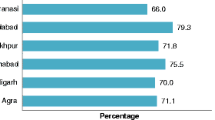Abstract
Since men are the dominant decision makers in India, it is prudent to discover the knowledge, perception, attitudes and contraceptive practices of men to improve their involvement in the reproductive health needs of families. Three thousand and seventy-two married men from a tribal Primary Health Centre (PHC) area in Thane district of Maharashtra State, India were surveyed with special emphasis on investigating the reasons for not accepting male methods. The majority of them not only had no concept of family spacing, but had not even taken any initiative to improve their knowledge or acceptance of condom/vasectomy. Men who were aware of contraceptive methods had little knowledge of their correct use. Of the men, 53.7% had positive views about their role in family planning while 66.2% of men stressed the need to improve the acceptance of male methods by providing knowledge and information through sources such as radio, television, door-to-door campaigning and interpersonal communications. Thirty per cent emphasized the need to improve the availability and quality of services. This study indicates a pressing need for effective intervention strategies, both at the community and the clinic level, backed with efficient counselling, motivation and provision of services in rural and remote areas.
Similar content being viewed by others
References
National Family Health Survey (NFHS; 1992–93). In: Maharashtra Summary Report. Population Research Centre, Gokhale Institute of Politics and Economics Pune and International Institute of Population Studies (Publishers), Bombay, August, 1994.
Family Welfare Programme in India. Year Book (1996–1997), New Delhi, Department of Family Welfare, Ministry of Health and Family Welfare, Sept. 1998.
Oni GA, McCarthy J. Family planning knowledge, attitudes and practices of males in Ilorin, Nigeria. Int Fam Plann Perspect. 1991;17:50–5.
Mbizvo MT, Adamchak DJ. Family planning knowledge, attitudes and practices of men in Zimbabwe. Stud Fam Plann. 1991;22(1):31–5.
Isiugo-Abanihe UC. Reproductive motivation and family size preferences among Nigerian men. Stud Fam Plann. 1994;25(3):149–61.
Ramachandran I, Chandrasekhar R. Perceptions about Nirodh among users and peripheral health workers: A psychosocial study. J Fam Welfare. 1992;38(4):25–36.
Seshagiri Rao K. The influence of community based distribution (CBD) programme on contraceptive choice. J Fam Welfare. 1990;36(3):86–106.
Zachariah KC. Some comments on the demographic transition in Kerala. Demography India. 1990;19(2):183–8, New Delhi.
Census of India (1991): Series-1, India Paper-1 of 1991. Provisional Population Totals. Registrar General and Census Commissioner, India.
Balaiah D, Ghule M, Naik DD, Parida RC, Hazari KT. Fertility attitudes of men in an urban-setting — A cross sectional survey analysis. Adv Contracept Deliv Syst. 1997;13(1–2):1–11.
Mutharayappa R, Choe MK, Arnold F, Roy TK. Son preference and its effect on fertility in India. In: National Family Health Survey Subject Reports. International Institute for Population Sciences, Mumbai, India and East-West Center Program on Population, Honolulu, Hawaii, USA. March 1997; No. 3.
National Family Health Survey (MCH and Family Planning) 1992–93. In: India Introductory Report. International Institute of Population Studies (Publishers), Mumbai, October 1994.
Joshi JV, Gokral JS, Rathod D et al. Contraceptive utilization in 842 rural women in PHC Kaman. J Obstet Gynaecol India. 1990;40:96–8.
Tripathy SP, Ramachandran CR, Ramachandran P. Health consequences of vasectomy in India. Bull World Health Organ. 1994;72(5):779–82.
Singh KK, Bloom SS, Tsui AO. Husbands' reproductive health knowledge, attitudes, and behaviour in Uttar Pradesh, India. Stud Fam Plann. 1998;29(4):388–99.
Karra MV, Stark NN, Wolf J. Male involvement in family planning: A case study spanning five generations of a South Indian family. Stud Fam Plann. 1997;28(1):24–34.
Author information
Authors and Affiliations
Rights and permissions
About this article
Cite this article
Balaiah, D., Naik, D., Parida, R. et al. Contraceptive knowledge, attitude and practices of men in rural Maharashtra. Advances in Contraception 15, 217–234 (1999). https://doi.org/10.1023/A:1006753617161
Issue Date:
DOI: https://doi.org/10.1023/A:1006753617161




